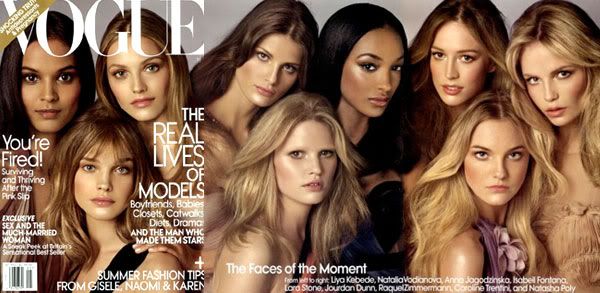From my experience, I have been more dependent on blogs when I need news on fashion. There are countless blogs on the internet catering to the idea of fashion but who is a professional or not? "Last February, 22 per cent of the total press accreditations granted by the British Fashion Council to LFW were given to bloggers. This year, the number has increased to 33 per cent" (Leitch). These bloggers sit front row on the hottest runways, next to top journalists. So if they are allowed in the same seats as the professionals, aren't they professionals themselves?
Bryan Boy is a blogger who was seated front row at the Dolce & Gabbana show, sitting only two seats from Anna Wintour, the editor-in-chief of American Vogue. With his laptop out, he, along with three other bloggers were invited to blog the show from their front row seats. Bryan Boy is a blogger who sits alongside the editor of a top selling magazine with 18 national editions. Now, professionals and bloggers sit side by side in the most exclusive fashion shows, clearly blurring the lines of professionals and amateurs.
Shirky argues that the outcome of this mass amateurization will be strongly prevalent. There were many obstacles "when reproduction, distribution, and categorization were difficult" (Shirky 78) but now as technology advances, some professional may be phased out by the ordinary patron. Mass amateurization is that it is not only limited to the media, it will spread into other professions as well "into the global society" (Shirky 80).
I feel that the future of the media professional will evolve greatly from where it stands today. The definition of journalists and the clear distinction between a professional and a amateur should be revised as journalism has evolved. This allows a clear guideline for those who are able to enjoy journalistic privileges.
Works Cited
Leitch, Luke. "Bloggers Are Snapping up Front Row Seats at London Fashion Week - Times Online." The Times | UK News, World News and Opinion. 23 Feb. 2010. Web. 03 Aug. 2010.
Shirky, Clay. Here Comes Everybody: the Power of Organizing without Organizations. New York: Penguin, 2008. 55-80. Print.
Shirky, Clay. Here Comes Everybody: the Power of Organizing without Organizations. New York: Penguin, 2008. 55-80. Print.



No comments:
Post a Comment